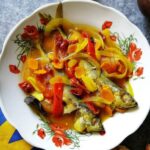Pinasakan: A Popular Kadazandusun Preserved Fish from Sabah
Pinasakan is a popular preserved dish among the Kadazandusun tribe in Sabah. The full name is actually Pinasakan Sada. Literally pinasakan means ‘reducing the volume of liquid through boiling/evaporating’, and sada means ‘fish’. It is also called Parasakan or Pinarasakan, depending on the region, but Pinasakan is a more well known name.
One of the staple food of Kadazandusun people is fish, even though they stay near the highlands. Traditionally, they obtained the fish from towns that had access to the sea, by exchanging with their own forest products, vegetables and tobacco. Since the trip home sometimes took days, the Kadazandusun people had to ensure that the fish can withstand the long journey without going bad. Refrigeration did not exist back then, so they had to preserve the fish using sour fruits, and hence the birth of Pinasakan/Pinarasakan.
Typically, Pinasakan features basung fish, a naturally oily fish that retains its moisture even after cooking. The preparation begins by cooking the fish in a pot over very low heat. Sour fruits, such as takob akob (a tangy wild fruit), fresh turmeric, salt, and various other options like bambangan (wild mango), belimbing buluh (a native sour fruit), unripe mango, asam jawa, and tamarind, are added to infuse the dish with their delightful flavors. Complementing the sour fruits are lemongrass, bird’s eye chilies, and ginger, further enhancing the overall taste profile.
One of the key characteristics of Pinasakan is the lengthy cooking process under low heat. The dish simmers slowly, allowing the broth to reduce to half its original volume. Through this method, the fish becomes thoroughly preserved, enabling it to be enjoyed without reheating for several days. The result is a dish that tantalizes the taste buds with its rich flavours and satisfying textures.
Pinasakan pairs exceptionally well with fragrant white rice or the traditional Sabahan dish, ambuyat. For those seeking an extra kick, a dash of sambal complements the dish perfectly, adding a delightful spicy note to the overall experience.
While Pinasakan is typically prepared in the comfort of one’s home, this delectable dish has gained popularity and can now be savoured at many traditional cuisine restaurants throughout Sabah.




